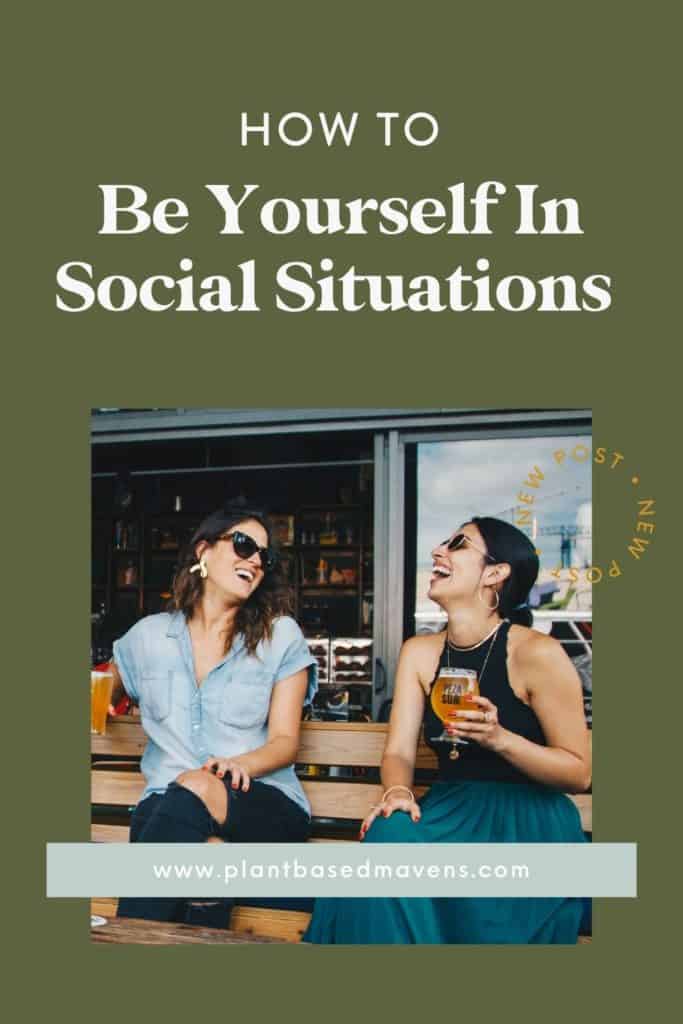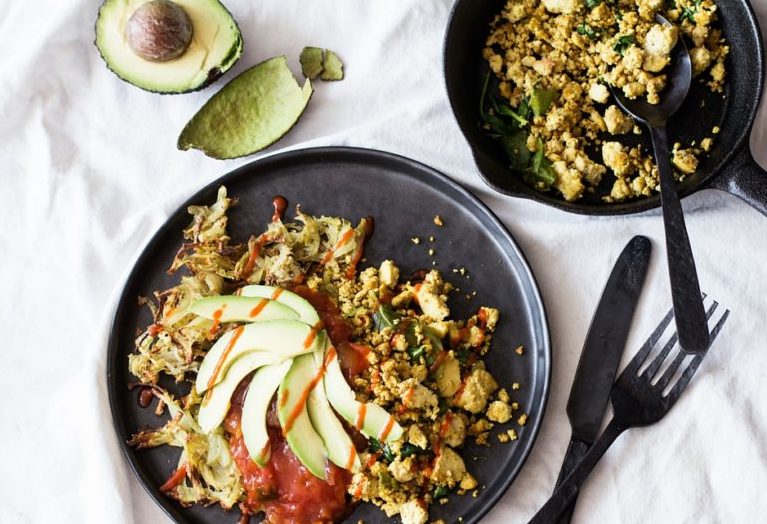‘Tis the season for social events! If you have social anxiety or struggle to be yourself in big gatherings, you are not alone. Social interactions can be both fun and nourishing AND difficult and draining. Practicing self care before, during, and after social situations is so important for reducing social anxiety, showing up as your best self, and staying healthy and grounded through the holidays.
Here are some self care strategies for social situations. These will help you be yourself, care for yourself, and show up in social situations in a way that feels healthy and authentic.

5 Strategies For How To Be Yourself In Social Situations
Set boundaries.
A boundary is the distance between you and another person that allows you to show up as the best version of yourself. In other words, boundaries are a normal, healthy part of every relationship. Your ability to set boundaries is a sign of your self-respect and self-care. When healthy boundaries are in place, you will feel more present and connected in any social interaction.
Reflect on the boundaries that are necessary for you, and communicate them to friends or family.
Examples:
- “I am going to start each day with a long walk while I’m visiting.”
- “I prefer not to talk about X subject.”
- “I feel my best when I’m rested, so I need to get to bed by 10pm.”
- “I’m full – I’m going to pass on dessert, thank you.”
- “Alcohol makes me feel tired – do you have any water or tea instead?”
Stop worrying about what other people think of you.
This one is easier said than done, but remember that what other people think of you is none of your business! We are all entitled to our own perspectives, thoughts, and opinions. And what someone thinks about you is just that – their opinion and not fact! Getting caught up in worrying about what others are thinking about you sends you down the path of making up elaborate stories about what they’re thinking. The stories we write are rarely positive and never helpful.
Do you know what is your business? What YOU think of YOU. Your thoughts about yourself are the only thoughts you can control, and by shifting your focus to practicing positive self-talk and self-respect, you will begin to care less and less about what is going on in other peoples’ minds.
Identify your anchors.
If you are prone to getting caught up in your thoughts in social situations, an anchor can help. Anchors are tools and strategies that bring you back into the present moment. They are used in mindfulness and can help you drop into your body and stay connected to your internal cues instead of getting swept away by all of the external stimuli and pressures in social situations.
When it comes to food, an anchor can help you connect to your hunger and fullness cues, avoid overeating, stay out of food guilt, and make food choices that feel good to you.
Anchors can also help you identify other needs that might come up: the need for some space, the need to change the conversation topic, or the need to switch from wine to water.
Examples of anchors that can help with self care in social situations:
- Physical movement – taking a quick walk, yoga, running
- Routine – sticking with a loose routine while away from home
- Meditation
- Taking 3 deep breaths
- Discreetly drawing your attention to physical sensations while in a social situation (feeling your feet on the floor, your clothes on your skin, or the sun on your face)
Communicate your needs.
Many people, especially women, are prone to push away their own needs in favor of meeting others’ needs. This is the quickest route to feeling resentful, burnt out, and completely drained. Practice listening to your needs. Set an alarm on your phone to go off every few hours and ask yourself, “what do I need right now?”
Then, practice responding to those needs. Communicating and responding to your needs may feel even harder than identifying them! But we can’t expect other people to read our minds. As Brene Brown says, clear is kind. If you need a little space, take it. If you need some fresh air, take it. If you need rest, take it. If you need a green juice, drink it. If you need a cookie, eat it. You deserve to have needs and to meet your needs. Doing so is going to make you a better mother, friend, daughter, sister, and colleague. I promise!
Practice self-acceptance.
I work with so many women who outsource their acceptance to other people. They live by the mantra, “If everyone else is happy with me and accepts me, then I’m doing okay.” We are social beings, and it’s hardwired into our survival mechanisms to want to feel accepted by the larger group. Family and long-standing relationships in particular can pull us into this place of trying to earn approval and acceptance.
But if we want to truly show up as our authentic selves in the world, we must stop relying on external sources of acceptance. We have to learn to acceptance ourselves – even when we don’t feel accepted by others. Self-acceptance fosters an unwavering sense of “okayness” in the world. When you go into social interactions with full acceptance of yourself, you are free. You have nothing to lose. The stakes aren’t as high as when the entire interaction is about you earning validation.
How to nurture your self-acceptance:
- During these last few weeks of the year, start your day with a list of 3 things that you appreciate about yourself. If you can’t think of anything in the moment, reflect on your past and examples where you were proud of an accomplishment, or the effort you put into something, or the way that you handled a situation.
Almost everyone faces a little bit (or a lot) of social anxiety from time to time. Remember that you are innately valuable and what you bring to the world is valuable too.


